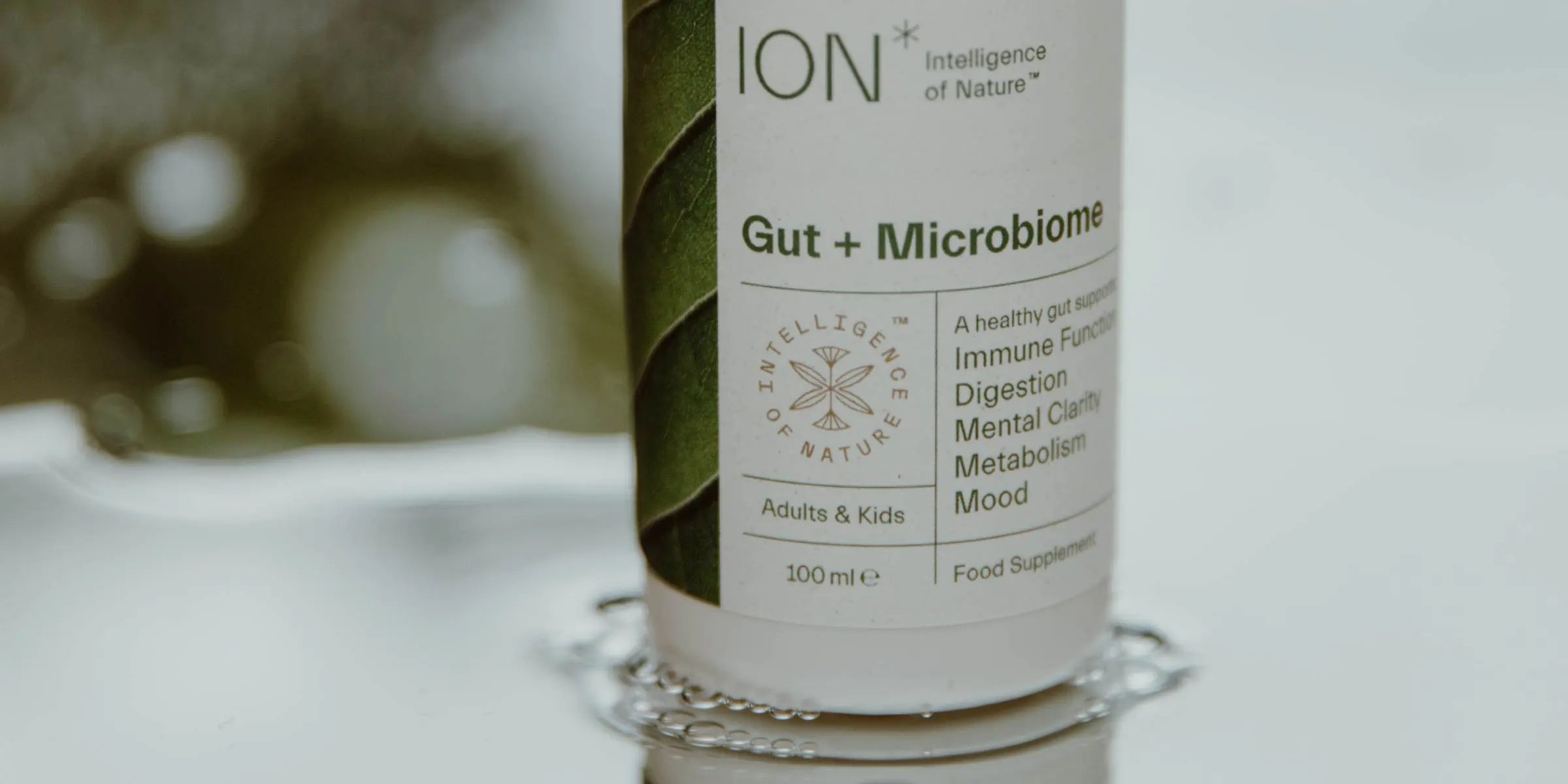Consider this: there is no shortage of idioms about gut feelings–butterflies, intuition, “trust your gut”, vibes, instinct. For an organ normally considered responsible solely for digestion, we certainly have a lot of phrases that make it sound as if the gut has a mind of its own.
Well, it turns out that this isn’t coincidental. Your gut sort of does have a mind of its own. That’s your gut-brain axis.
So, what is the gut-brain axis, exactly?
Don’t worry, no graphing paper or calculator necessary for this one. (But the answer is possibly no less complex or mind-blowing than high-level mathematical theory, either.)
In the scientific community, some have taken to calling the gut-brain axis “the second brain” colloquially or the “Enteric Nervous System” (ENS) a bit more formally. This vast communication network refers to the over 100 million nerve cells that line our gastrointestinal tract. (And, not to be confusing, but it actually begins in the sinuses, not the gut.) This “second brain” is a communication channel for your whole body, and is deeply entrenched in, and connected to, important facets of your well-being. When it’s out of sync, communication can break down and trigger health issues.
Take the vagus nerve for example, one of the biggest nerves connecting your brain and your gut. Recent studies have shown that psychological stress can harm the vagus nerve and its ability to function as a two-way communication channel, which can actually lead to the development of gastrointestinal disorders, like IBS.
What does the gut-brain axis do? Why do we have one?
The more research emerges, the more we understand just how deep the connection between our gut and our brain (hence, the gut-brain axis) truly is. While studies are ongoing and our comprehension of the gut-brain axis is fairly new, all signs point to the gut-brain axis being extremely important to our health and well-being.
One exciting development is that we now know that a large percentage of the body’s neurotransmitters like serotonin and dopamine are produced in the gut, not the brain. Neurotransmitters are the chemicals by which your gut and brain communicate. Neurotransmitters are responsible for regulating emotions, including the “fight or flight” response and, recent studies show, can also affect blood flow, bowel movements, nutrient absorption, the immune system, and the body’s microbiome.
When these neurotransmitters are thrown off, the disruption may result in inflammatory gut conditions and diseases, but can also possibly lead to neurodegenerative problems, as well. That’s because this deep connection between the gut and the brain have profound effects on one another, and why something like poor gut health can be partially attributed to (if not fully responsible for) the onset and progression of many mental disorders, including depression, schizophrenia, autism, epilepsy, and even migraines. This may also be why studies have shown that those with good gut health are shown to be more resilient to the negative impacts of stress and pressure.
The answers to why mental health is connected to gut health via the gut-brain axis can actually be found in our microbiome–the bustling, thriving, unique ecosystem where countless viruses, fungi, microbes, and bacteria live together and help keep our bodies in balance. The gut microbiota in our bodies plays a huge role in our health throughout our entire lives, starting from when we are born (literally!). Multiple studies have shown changes to the gut microbiota in early life–via antibiotic exposure, lack of breastfeeding, infection, stress, and other environmental influences–can result in long-term effects on physiology and behavior and affect the gut-brain axis.
What can mess with the gut-brain axis?
The gut microbiome develops at the same time as the central nervous system, but birth and early life aren’t the only times the gut microbiota (and by extension, the gut-brain axis) can be affected and changed. Everything from our environment to what we eat to antibiotics (and more) can have an effect on our gut microbiome.
So, to put it simply: if it’s bad for the gut, it’s bad for the gut-brain axis.
A bad diet, stress, antibiotics, gluten, genetics, glyphosate and other environmental toxin exposure can all negatively affect the health of the gut and, by proxy, affect the ability of the gut-brain axis to function properly–which means a whole host of things are at risk of not functioning properly as well.
Emerging evidence suggests that an off-kilter gut-brain axis may even change the metabolism, affecting eating habits, satiety, and weight management. An interesting study conducted in 2020 showed that a disrupted gut-brain axis can create a strong preference for the taste of sugar, even. (As if resisting excess sugar wasn’t already difficult enough.)
But there’s far more, far-reaching consequences that can occur when the gut-brain axis pathways are thrown off. A big one to consider is that the physical barrier between the central nervous system and the cardiovascular system (the blood-brain barrier) can become more porous with a disrupted gut-brain axis. When this barrier leaks, it can lead to neuroinflammation of the brain and manifest as a variety of serious health issues like Alzheimer’s and Parkinson’s disease.
What can you do to improve (and protect!) your gut-brain axis?
If you’re interested in improving your gut-brain axis, one of the most important things you can do is improve your gut health. And one of the easiest ways to do that? Start with your diet.
Dr. Megan Rossi, founder of The Gut Health Doctor says: “For a simple idea of how to improve your gut health naturally, aim for at least 30 different plant-based foods a week, full of fiber and beneficial plant chemicals. The more diversity, the better.”
While you’re aiming to get your nutritious meals in, be sure to learn the best foods for gut health that are especially adept at supporting your gut function:
Omega-3 fatty acids
These fatty acids are an essential fat that the body cannot produce, so we must get them via food (think walnuts and flaxseeds). These fats are unique in that they have the ability to change the structure and function of cell membranes, and have a large swath of benefits, from improved cardiovascular and metabolism function to better gut health. They have even been shown to reduce the risk of brain disorders.
Fermented foods
Fermented foods–including yogurt, kimchi, and sauerkraut–all contain healthy microbes including lactic acid bacteria which are good for gut health.
High-fiber foods
There are many reasons high-fiber foods are good for you. A big one is that high fiber foods like nuts, whole grains, seeds, fruits, and vegetables contain prebiotic fibers that your gut bacteria love. (Also, prebiotics can reduce stress hormones!)
Polyphenol-rich foods
These naturally-occurring organic compounds from plants have a multitude of beneficial influences on one’s health (including increasing healthy gut bacteria and improving cognition) thanks to their anti-inflammatory and antioxidant properties. Cocoa, green tea, and olive oil are polyphenol-rich foods.
Tryptophan-rich foods
Most of us think of turkey when we think of tryptophan, but nuts, seeds, oats, and even bananas are also high in this helpful amino acid. How helpful? It converts into serotonin, a crucial neurotransmitter.
But there’s more to better gut health–and a better functioning gut-brain axis–than diet alone. That’s where ION* Gut Support comes in.
How can ION* Gut + Microbiome help the gut-brain axis?
Unlike your diet, which most likely changes from day to day and, let’s be honest, can’t be perfect all the time (even organic foods can expose you to gut-harming glyphosate and other toxins), ION* can help support your gut health every day.
ION* is unlike any other supplement or wellness solution. Where probiotics and prebiotics add new things to your gut (and even “good” bacteria can be a bad problem), ION* works completely differently. ION* is scientifically proven to help your gut function the way Mother Nature intended.
ION* Gut + Microbiome works by bolstering your gut on the cellular level, tightening critical junctions in the intestinal lining that are necessary for your gut to function at its best. This approach helps boost your own unique and innate gut health and also helps support your all-too-important gut-brain axis function, as well. It’s a win-win.
And because ION* is all-natural, liquid, tasteless, and gentle enough to take every day, it’s more like a win-win-win-win-win.
Experience for yourself the difference a healthier, happier gut can make.




